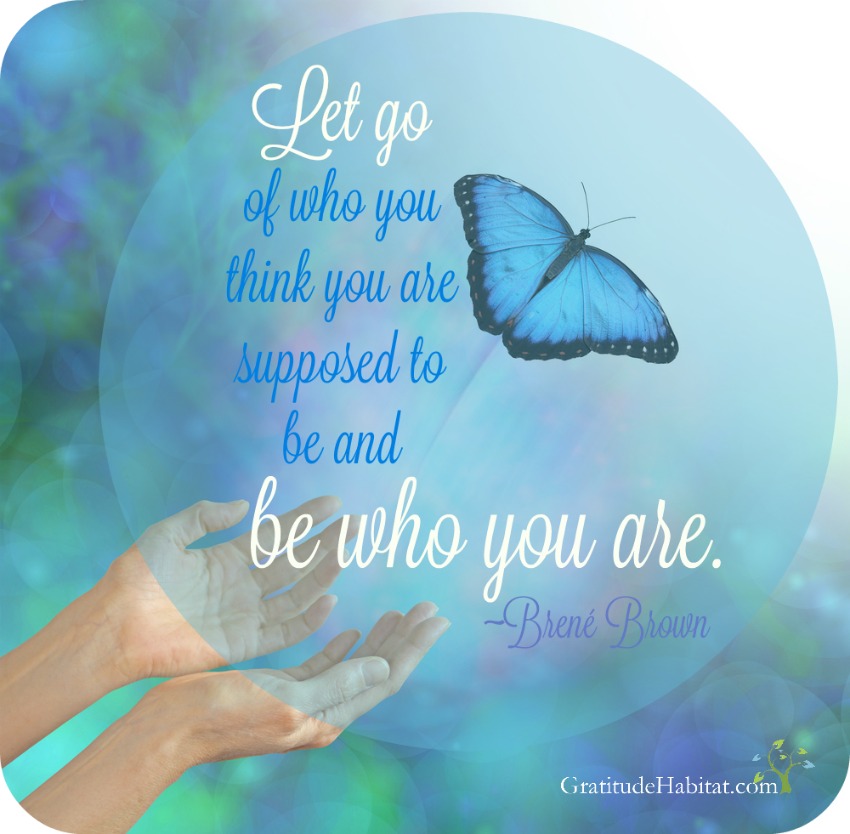“Let go of who you think you are supposed to be and be who you are.” ~Brené Brown
Many of us are able to be kind and accepting of others but find it difficult to extend the same love to ourselves.
Numerous studies have shown that when we accept and appreciate who we are as a unique individual, our happiness quotient increases. People who practice self-compassion, who accept themselves – flaws and all – are significantly less inclined to suffer from anxiety and depression. Self-acceptance leads to reduced stress, a more optimistic outlook on life as a whole, and makes us more grounded and at peace.
Appreciating and accepting who we are as distinct, unique individuals can be tricky. After all, we are bombarded on a daily basis with images of what we should look like, about the glamorous and fulfilling lifestyles we should be living, about the amazing house we should own, the cars we should be driving, the high-powered careers we should have.
All of this perfection is unfounded and unrealistic but still, many of us buy into this ideal. We compare how we look, what we earn, what we own, and what we’ve achieved to all of those “perfect” people out there…and we fall frighteningly short.
This ingrained practice of comparing ourselves to others as well as to who society and the media tell us we should be is dangerously self-deprecating. The majority of us don’t measure up to these false set of societal ideals, causing us to believe we are “lesser than”.
“Don’t lose your real self in the search for acceptance by others.” Nishan Panwar
When we stop attempting to “fit into the world” and instead, give of our unique talents and embrace the authenticity of who we are, we can nurture a healthy self-image that helps us to accept and appreciate that being “us” is perfectly okay.
So, how do we begin to be our true selves and tune out all of the external expectations and input?
It starts with an intentional practice of self-love and acceptance. Below are four mindful techniques to achieving self-compassion and appreciation.
-
Forgive yourself
It is okay to not be perfect. No one is. Don’t beat yourself up if you haven’t risen up the corporate ladder fast enough (or at all), acquired that luxury home, married the perfect person, had those 2.5 children. But cultivating forgiveness of ourselves involves reframing how we think about life: what it means to be successful and disembarking from that societally-imposed, never-ending arduous journey for excellence. We each need to decide on our own definition of personal success and discard unrealistic ideals that erode our self-worth and acceptance of self. This is the first step in forgiving.
-
Give Yourself Permission To Be Yourself
Even author and authenticity advocate, Brené Brown, sometimes fall prey to meeting others expectations. Being true to ourselves is not a default behavior, says Brown, who admits that sometimes even she finds it easier to “just be what others want us to be” rather than forging our own path. When she feels the pull of conformity in her appearance or behavior, she will write herself a permission slip to be her true self. This could mean wearing sensible shoes when others are wearing high heels to letting your exuberance show when everyone around you is restrained. Brown keeps this slip on her person as a reminder and a source of strength to be who she is.

-
Do What Is Important To You
Rather than aligning our values with other people or with what others expect from us, decide what is important to you as an individual, what resonates with you and your life. You don’t need to justify yourself or apologize for being different. It takes courage to be you. It is so much simpler (but much less rewarding) to do what everyone says we should.
-
Celebrate Your Accomplishments
We live in an achievement-oriented society that tends to focus on the material and ignore other vital accomplishments such as happiness and mental/emotional wellbeing. By understanding and being true to our own unique values, the things that are the most important to us as an individual bubble to the top. These are the goals we should strive toward. Focus on what makes you complete. It could be exploring the world, staying home with your children, getting a degree, volunteering your time to a cause or organization, ditching that career that makes you miserable and finding something that speaks to your soul… When we work toward our goals instead of the goals of others, we are motivated, inspired, and much more likely to achieve a positive outcome. And, when we do reach a milestone, celebrate! You’ve worked hard to get where you are and it is important to raise a glass to yourself.
You are the most important person in your life.
Think about that for a minute. Yes, our significant other, children, family, and friends are important but none of us can fully give of ourselves if we don’t “put our own oxygen mask on first.”
By learning to appreciate yourself, to accept and embrace your individuality, and move purposefully in the direction of your choosing, you honor your truth. This mindful harnessing of your authenticity increases your happiness, wellbeing, and makes you much more able to appreciate, love, and accept others.
“There is no better way to invite more grace, gratitude, and joy into our lives than by mindfully practicing authenticity.” ~Brené Brown
May your day be filled with self-love, gratitude, and good things.






